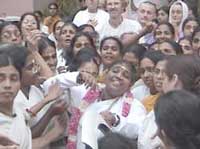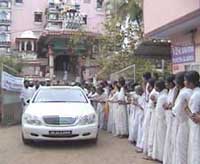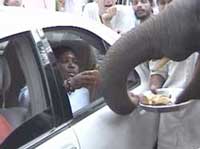10 October 2001, Amritapuri
The soft light of pre-dawn, the calls of tropical birds waking to a new day, and otherwise silence. There is, in this stillness, a big crowd at the foot of Amma’s steps, because no one is sure just when She will leave for the airport, and everyone wants a last glimpse, perhaps a word or a touch. Eyes are turned upwards, to Her window, where a light burns, and we feel it as a sign of Her presence.
The sun rises, the palm trees are no longer black silhouettes against a silver sky, but a strong deep green against brilliant blue. There is a flurry as the people who have stood so still and quiet, forming two orderly rows along the path Amma will take from the steps to Her waiting car, hear the door above opening and know She approaches — joy, on seeing Her; dread, for now She really is leaving.

There has been some question all along as to whether indeed Amma would go to Europe and America this winter, given the world situation since September 11. The first planned stop in Europe, in Helsinki, was cancelled; some of us ashramites staying behind had the mixed emotions of compassion for the people who would miss seeing Amma, and joy for not, ourselves, having to be without Her. We struggled inside with the conflicting feelings of generosity (She has, after all, come for the world, not just for the few who live in Her ashram) and attachment (it will be hard to be without Her here!). But we were not surprised when the Zurich programmes, for a time also cancelled, were reinstated: Amma’s children in Europe had been calling and writing, emailing and praying: “We need You! Please come!”
And so on this Wednesday morning, in early October, Mother was leaving behind this particular group of Her children to be among the children in Europe and America.

There She comes: just as, on every other Wednesday, She comes down these steps on Her way to give darshan. But this time the greeting crowd is bigger, and the darshan hall further than the few steps to the temple. We have stood in careful, respectful lines, waiting for our Mother, but that decorum can’t be maintained: She’s leaving! The empty aisle disappears, the silence is rent by the temple bell — everyone knows that when it rings three times, Amma is coming out. She is indeed: She descends the steps, smiling; we are no longer silent: voices are calling out “Amma! Amma!” and “Om Amriteshwaryai Namah!”
Unhesitating, She plunges into the sea of Her waiting children, stretching Her Hands as far as She can, touching everyone possible. She goes slowly, slowly, towards the car, taking time to question this daughter, give some orders to that one, laugh with this group, call out to those sons on the far side of the car.
She reaches the open car door, and generously does not get in right away. She stands a bit longer, slowly sweeping all directions with Her gaze. She lifts Her eyes upwards, seeing the sons standing on the brahmacharis’ balconies to the south; She turns east, and follows the sweep of the temple’s spiral staircase all the way to the top, for every step holds a son or daughter, or two!
Her gaze moves higher: in the sky, birds have gathered. It looks like the sky above a new Brahmasthanam temple, where without fail while Amma is performing the pratishta birds swoop in great circles. She has said the real pratishta (breathing of life into an image of God) must occur in our hearts, not just in statues of stone. Our hearts are overflowing, and so is Hers.
“Namah Shivaya, Makkale!” Amma calls out, raising Her hands in a salute above Her head.

“Om Parashaktyai!” calls a tremulous voice. Mother bends to take Her place in the car; someone shuts the door. Never mind — her window is immediately open, and Her Hands are reaching out for the touches of Her children. The car begins to inch forward, and the people clustered in front move to the sides. Long rows of ashramites have formed a “road” for Amma’s car: eastward behind the temple, around the East Wing, north between the temple and the new construction (where the kitchen used to be), through the front gate, towards the flats, and west towards the sea.
All along the way, as it becomes clear which side of the car She is on, you see people jumping across this “road” to reach the good side — the side where there is a chance of a touch, a glance. As the car inches forward, the long lines of white-clad ashramites resemble rows of supple palm trees bending below a gentle wind:
we stand straight, looking towards the approaching car; as it nears, we lean, and when it is abreast of us, we bend down to look inside and see our Mother, and our hands reach out to touch if not Her Hand then Her window. The car moves past and we straighten and turn, watching till there is nothing, no One, to see. It is a slow dance of leave-taking.
Just before the gate to the beach road stands Ram, the getting-bigger baby elephant. Every night after bhajans he gets a ten or fifteen minute playtime with Amma; he, too, will miss Her. Her car stops and a brahmachari is there with a big tray of bananas and biscuits. Ram knows the drill: he steps right up to the open car window, and Amma stretches out Her hand, offering him a good mouthful (that means a couple of bananas in one gulp).
Now he backs away to turn in a big circle: his special trick. Back to the car window for more treats.
While Amma caresses his trunk, She sees the people crowding too close for safety and calls out a warning. Our ever-alert, protective Mother. With a kiss on the thick rough hide of the long grey trunk, She bids Ram farewell, and allows Her car to move the last few metres to the boundary of the ashram.
While a good contingent of white-dressed ashramites runs along beside and behind Her car, now it is the colourful dhotis and saris of the villagers that line the route. Amma’s car makes its way south along the beach road. On the left, the multistoried flats, the temple and the hospital; on the right, simple concrete houses and thatch huts, palm trees, the `wide, white-sand beach, and the Arabian Sea.
Ahead, the children of Europe and America. Behind, the ashram children. All waiting.
